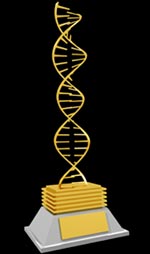
Roll out the red carpet and shine up your shoes—it’s “award season” for science. The biggest prizes: powerful glimpses into fundamental life processes that can yield deeper understanding of health and disease.
For instance, the 2015 Albert Lasker Basic Medical Research Award that’s being presented today highlights the seminal work of two scientists on the DNA-damage response, a mechanism that protects the genomes of all living organisms. Chemicals, radiation and duplication errors during cell division are constantly harming our genetic material. Healthy cells respond with a complex network of proteins that work together to mend the damage and halt cell division until repairs are complete. If injury is beyond repair, the proteins trigger cell death. Errors in the DNA-damage response can lead to cancer, neurodegenerative disorders and immune deficiencies.
The scientists recognized today took important steps toward elucidating the mechanics of the DNA-damage response. Evelyn Witkin of Rutgers University established its existence and its basic features in bacteria. NIGMS-funded researcher Steve Elledge of Brigham and Women’s Hospital expanded on some of Witkin’s earlier work in his investigations of the molecular underpinnings of the DNA-damage response in more complex organisms. Recently, he identified over 1,000 proteins that may play a role in this vital cellular process in mammals. He is now exploring the exact functions of these proteins.
The more scientists know about how the DNA-damage response works in healthy cells, the better their chances of developing therapies for when the process doesn’t progress as it should.
The Nobel Prize announcements coming up early next month will offer another opportunity to recognize important research that fuels scientific progress.
The research recognized by the Lasker Award was funded in part by NIH grants R01GM044664 and R01AI010778.

